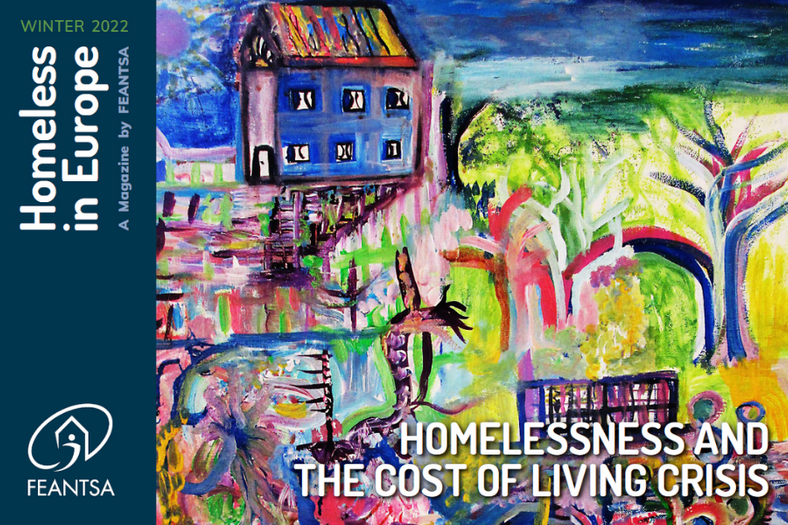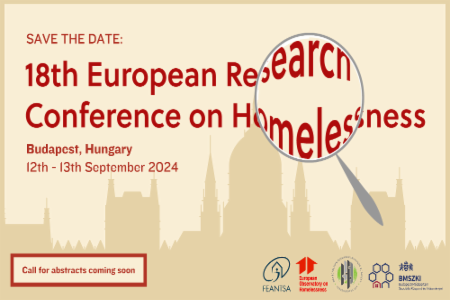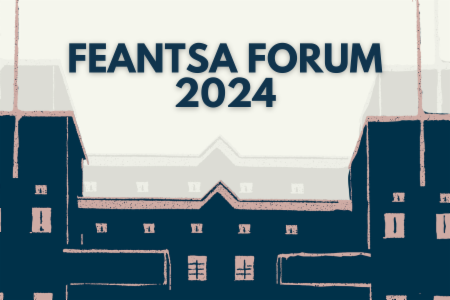
[Cover art ‘Thorn Garden’ by Mary Vallely]
Homeless in Europe: Homelessness and the Cost of Living Crisis
Read the magazine here (online PDF)
Due to a convergence of factors including climate, post-pandemic economic consequences and the Russian invasion of Ukraine, the European Union is now facing a historically high level of inflation (an average of 11.5% in October 2022). The countries with the lowest rates of inflation, such as France (7.1%), Spain (7.3%) or Malta (7.4%), have seen it has a great impact on their economies and households, whilst those with the highest rates, like Estonia (22.5%), Lithuania (22.1%) and Hungary (21.9%), have had to face the social impact of the inflationary pressure and the real concerns it entails. Inflation had been driven up by energy and food prices, and has turned into a cost of living crisis, as the cost of everyday essentials like groceries and bills are rising faster than average household incomes.
This cost-of-living crisis is hitting lowest-income groups disproportionally, as they spend a higher share of their total income on housing, heating, transport, and food, and were already limiting their consumption to the minimum necessary (their demand is therefore less price elastic). This magazine presents some of the repercussions of the cost-of-living crisis on people, homelessness organisations and the wider safety net offered by social service providers. It pictures a rapidly changing and therefore uncertain context, calling on homelessness organisations to adapt, reinvent themselves and … brace for impact.
Articles
Editorial by Clotilde Clark-Foulquier, Project Manager at FEANTSA
I. Homelessness and the Cost of Living Crisis
Homelessness and the Cost of Living Crisis by Nicholas Pleace and Carolyn Snell, School for Business and Society and Centre for Housing Policy, University of York
II. What do National Organisations Have to Say About the Cost of Living Crisis?
The cost of living crisis and rising rents: what does this mean for levels of homelessness in the UK? by Rebekah Stroud, Economist and Francesca Albanese, Head of Research and Evaluation, Crisis, UK
The cost of energy crisis in Hungary: what are the impacts on homelessness service providers? by Boróka Fehér, Policy Officer at BMSZKI, Hungary
An approach to tackling energy and water poverty: supporting social workers in the Brussels-Capital region by Centre d’Appui SocialEnergie, Federation of Social Services (FdSS), Belgium
Cost of living crisis: what are the impacts on homelessness? by Marthe Yohn, Director of ESMS, France, in collaboration with all French FEANTSA members
III. European and Global Perspectives
The cost of living crisis and the food banks of the FEBA network: what are the impacts on their daily activities? by Angela Frigo, Secretary General and Anna Friederitz, Assistant to the Secretary General, FEBA
The energy crisis and its effect on the long-term care sector across Europe by Anne-Sophie Wislocki, Head of Advocacy, Eurodiaconia
Climate change and homelessness: considerations of intersections and the cost of living crisis by Mariya Bezgrebelna, Ph.D. (cand), Centre for Addiction and Mental Health, York University Department of Psychology and Sean Kidd, Ph.D., Centre for Addiction and Mental Health, University of Toronto Department of Psychiatry, Canada





